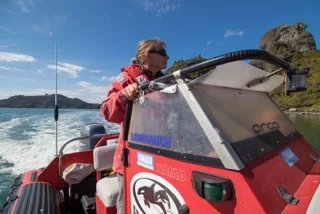Back in January I volunteered at the Orca Research Trust in Whangarai, New Zealand and had the incredible opportunity of assisting Dr. Ingrid Visser in the day to day running of her one woman orca show - The Orca Research Centre.
One of the selfless people on this planet fighting for the rights of whales and dolphins, Dr. Visser, lives and breathes orca research and is dedicated to the downfall of the captivity industry. You might also recognise her from the GoPro video or the documentary: The woman that swims with Orca.
Dr. Visser shared her valuable time with me in order talk about what we can all do to help Orca and their ocean home.
5 words that best describe you….
Pedantic, tenacious, determined, passionate, obsessed.
What gives you strength?
I think it’s making progress, if I can see that we’re just getting the tiniest bit ahead, in whatever field it is, whether its writing a scientific paper, or fighting the good fight, just a little bit of glimmer of hope gives me strength.
What makes you happy?
Being out with the Orca in the wild. Definitely! It’s beyond happy, it’s ecstatic when I’m with the animals.
How long have you been working with Orca?
Officially I’ve been working with the Orca since 1997, but unofficially it started when I was about 6 years old!
What makes the Orca so special?
I have never been able to put my finger on it! There are so many things, it’s almost like they’re an enigma and I’m yet to hear anyone really articulate it. They’re figuratively and literally very deep animals.
Where are your favourite places in the world to see wild Ocra?
1. New Zealand
2. Antarctica
3. Papua New Guinea
4. Argentina
5. The Pacific North (Russia, BC, Washington State)
6. Norway
7. Iceland
What has been your most incredible encounter with wild Orca?
Too many to count! I’d say the most incredible has to be involving rescues - whether its disentanglement or strandings, its not about my experience, it’s about managing to help the animal. To see them go free, to see them return to their family - that’s the most incredible thing.
Can you tell us a little known fact about Orca.
They don’t have eyelids! And there’s a lot of boy on boy action which is normal in the Orca world. It appears that this happens mostly because there is a female mate choice and the females typically choose the older males as they are demonstrating they’re able to survive for a long time - its like the ladies are looking for the Sean Connery’s of the Orca world! In the meantime there’s all these frustrated young males who want to express themselves sexually, so they hang out together and spend a lot of time together, which is pretty entertaining to watch!!
If you could ask the whales a question, what would it be?
Please teach me to speak Orca, then I could ask lots of questions!
You are an inspiration for women who want to work with whales, do you have any advice for them?
To know that you can do it. I was told that the only way I could work with whales was at SeaWorld and I knew at 6 years old that that wasn’t the right way to go. So I would say don’t give up on your dream. Remain true to yourself, remain true to your dream and you will achieve it.
You’re a long time dead so make the most of every opportunity that presents itself.
What can women do to help cetaceans?
There is nothing that we can’t do! From the smallest thing to the largest, some of the top whale biologists are women and some of the top fundraisers are women.
There is something really simple: Don’t ever buy a ticket to see a cetacean in captivity.
And fundraising is a huge asset. Donations can be the backbone of whether someone can get out and do research.
What can we do in terms of the bigger picture, to help the oceans in general?
For a start, women often use face scrubs and some of these have microbeads which are actually made of plastic. These are starting to be outlawed, which is fantastic but they’re still available so make the choice to go for something that is organic instead.
Don’t use plastic bags, they are NASTY for the marine environment.
Choose to use chemicals that are biodegradable.
In the big scheme of things these little things will make the biggest difference. Individually we are not going to be able to change the world but we can change how we impact the world.
To learn more about Dr. Visser and her work with Orca please visit:



